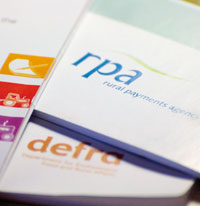Government could tighten up on farm regulations

The state of public finances could force DEFRA and the Rural Payments Agency to be tougher when setting rules for farming support and schemes, through fear of being fined by the European Commission, members of the Central Association of Agricultural Valuers were warned last week.
Record keeping will become even more burdensome, while the outlook for the EU budget review is for lower single payments, Jeremy Moody, the CAAV’s secretary and adviser, told members at their annual general meeting in Stratford-upon-Avon.
Because of tighter public finances, farmers adapting to a freer but more volatile marketplace may be faced with a shift in approach, from schemes to regulation, which would impose additional costs, he said.
“The EU Commission’s figures for 2010 show the British government spending over 50% of GDP next year, but raising less than 40% in tax. That means more taxes or less spending,” Mr Moody pointed out. “These stark figures leave little or no room for new projects or nice ideas. Government will have little money to pay for anything new and so may reach more swiftly for regulation to tackle problems.”
He said DEFRA was likely to be even more sensitive about the risks of fines after inspections by EU auditors, whose perception of what they see could be unpredictable and “narrow”. “Even Denmark has been fined €100m for failures under the old Arable Area Payments Scheme,” Mr Moody said.
He cited the possible change in rules allowing minor non-agricultural use of land, such as for shows, over a limited number of days in the year, as a potential loss of flexibility. “Government may discard options that would be sensible in handling our diverse and flexible economy so that it can be more confident it is within EU rules,” Mr Moody said.
Increased bureaucracy and paperwork was also likely, he warned. “This is increasingly the price paid for receiving the single payment or agri-environment money, and is a key part of NVZ rules. Failures here will cost the farmer money – and the threat of fines will force government to be awkward rather than practical.”
The EU would shortly start reviewing its budget for 2013 to 2020, Mr Moody said. “All the signs are that the single payment scheme will continue,” he said. “There will be pressure to move to an area basis, affecting Wales and Scotland; even this change may not be easy for England. If, as seems likely, there will be less money for the CAP, Brussels may struggle to protect current agri-environment spending with markedly lower levels of single payment to fund that.”
